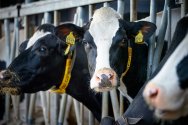
The Sustainability Consortium: achieving sustainability together with supply chain partners
The global production and consumption of consumer goods accounts for more than 60% of all greenhouse gas emissions and 80% of all water use. Food production is an important contributor to this and is responsible for two-thirds of the worldwide loss of tropical forests. Wageningen Economic Research contributes to decreasing the impact of food production by working together with retailers, buyers and suppliers to facilitate the sustainable production, use and reuse of these goods. To meet these goals, we have partnered with The Sustainability Consortium (TSC).
Joint approach needed
There are many sustainability initiatives around the world aimed at measuring the sustainability performance of certain product categories, themes or regions. However, there is a lack of joint coordination, and so retailers, wholesalers and caterers are forced to work with a wide range of instruments, such as dozens of different certification systems.
Moreover, some product categories lack adequate instruments, and the instruments that do exist often cover only a small part of the total purchased products, or only some of the relevant sustainability themes (e.g. only animal welfare or only social aspects). Finally, some instruments are only available in certain regions, or they only guarantee a minimum level of sustainability, and so do not encourage continuous improvement.
Countless questionnaires
Some buyers collect various information about their suppliers’ sustainability performance using their own questionnaires, creating an extra administrative burden for the suppliers.
So buyers face various bottlenecks in the search for a uniform, consistent and efficient way to increase the sustainability of the thousands of products in their product ranges, while at the same time these buyers play a crucial role in the sustainability process.
Standardised global monitoring system
The Sustainability Consortium (TSC) has developed a globally harmonised measurement and reporting system that allows companies to monitor the sustainability of consumer products supply chains. This allows companies to work on the continuous improvement of their products.
TSC translates the complexity of sustainability into simple tools for buyers and their suppliers. The supply chain partners gain insight into the sustainability of their products through access to hotspots, performance indicators and improvement opportunities for various types of products. They can also see what steps they can jointly take together with suppliers and buyers to make the transition to sustainability efficiently and effectively.
Contact us to get to work on sustainability together with your supply chain partners!
Businesses and scientists join forces
The members of The Sustainability Consortium include multinationals such as Walmart, Bayer, Unilever, Pepsico and BASF. Three universities are responsible for the coordination of the partnership: Arizona State University, the University of Arkansas and Wageningen University & Research.
Wageningen Economic Research coordinates the European activities on behalf of Wageningen University & Research.
News
Testimonials
Projects
Dossier
TSC's Partners
SupplyShift
SupplyShift provides the platform where suppliers and retailers come together to use The Sustainability Consortium methodology to research sustainability improvements for more than 100 product categories. Visit www.supplyshift.net for more information.
Questionmark
Questionmark uses an app to show consumers how sustainable and healthy food products in supermarkets are. For this purpose, Questionmark uses The Sustainability Consortium methodology (as well as other methodologies). Visit www.thequestionmark.org for more information.

